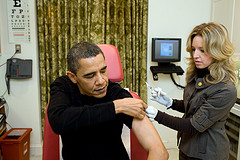Shot of Truth About the Flu Vaccine

A White House nurse prepares to administer the H1N1 vaccine to President Barack Obama at the White House on Sunday, Dec. 20, 2009.
(Official White House photo by Pete Souza)
With flu season right around the corner, the NIH influenza vaccination clinic is on target to begin in early- to mid-October. While most NIH employees are eager to receive the vaccine, some remain skeptical of its benefits.
Past studies have shown in years when flu strains in the vaccine match well with the strains circulating in the community, the
vaccine can reduce the chances of getting flu by 70 to 90 percent in healthy adults. The vaccine may be somewhat less effective in
elderly persons and very young children, but vaccination can still prevent some serious complications of flu. In healthy adults younger than age 65, the flu vaccine can also prevent lost work days and unnecessary doctor visits and antibiotics. This year the vaccine is designed to prevent both seasonal and pandemic H1N1 flu infection. A major reason for healthcare workers to be vaccinated is to protect our patients. Several studies have shown that vaccinating healthcare workers reduces influenza complications and influenza-associated mortality in patients.
The most common reason cited for avoiding vaccination is concern about side effects. Minor consequences such as soreness of the arm or inflammation at the vaccination site are relatively common, but serious or lasting side effects are extremely rare.
CC Deputy Hospital Epidemiologist Dr. Tara Palmore wants to set the record straight on more myths about the flu vaccine. “A misconception cited by a number of people was that they could get flu infection from the vaccine. That is not possible because it contains only killed virus.”
Well-publicized adverse reactions have caused unnecessary anxiety about the vaccine, Palmore said. The 1976 swine flu vaccine was associated with cases of Guillain-Barre syndrome, a paralyzing neurologic response that is usually reversible. “The rate of Guillain-Barre syndrome associated with flu vaccination is miniscule – one in one million vaccinees— and most patients recover completely.”
If you have any questions or concerns about the Influenza vaccine, please contact the Hospital Epidemiology Service at 301-496-2209.
